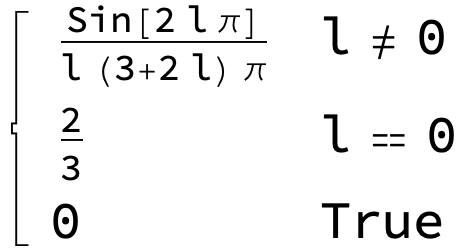I am trying to integrate a product of 2 Legendre polynomials as follows:
Integrate[LegendreP[1, x] LegendreP[2l+1, x], {x, -1, 1}]
I get the result:
Sin[2 l \[Pi]]/(l (3 + 2 l) \[Pi])
which is always 0 for integer values of l, but shouldn't the result be 0 for $2l+1\neq1$ and 2/3 for $2l+1=1$, since the LegendreP are orthogonal?


Limitas some answers below show. This is sometimes described in terms of "generic" results. Many times it corresponds to the limitations of our notation. For instance, in results that haveSin[]of the parameter (as in your case), replacingSin[]bySinc[]viaSin -> (# Sinc[#] &)often gives a result valid for all values of the parameter. NoteLimit[ans, l -> value]does not take a lot of time whenansis continuous, though it is slower than direct substitution. $\endgroup$